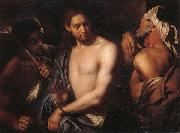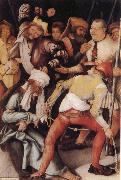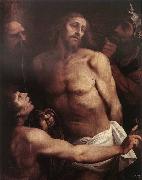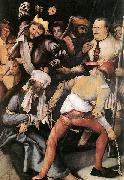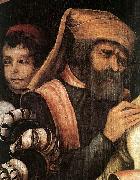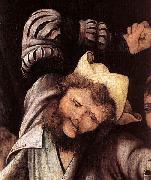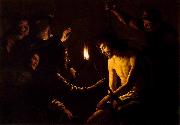Wholesale Oil Painting No Minimum |
|||||||||||
|
|
|||||||||||

|
|||||||||||
|
|
|
||||||||
|
|
||||||||
The Mocking of Christ
The Mocking of Christ Painting ID:: 1834 |
Pinakothek, Munich Pinakothek, Munich |
|||||||
|
|
||||||||
|
|
||||||||
|
|
The mocking of christ
The mocking of christ Painting ID:: 27376 |
mk56
oil on canvas
mk56 oil on canvas |
||||||
|
|
||||||||
Grunewald, MatthiasGerman Northern Renaissance Painter, ca.1470-1528 .the traditional name of a painter whose real name is believed to have been Nithardt or Neithardt. He was active at Isenheim nr. Colmar c.1514 and in Frankfurt c.1526. Gr??newald's principal work, an elaborate altarpiece of many panels painted for the monastery at Isenheim (Isenheimer Altar), is now in the Colmar museum. |
||||||||
|
|
||||||||
|
|
The Mocking of Christ
The Mocking of Christ Painting ID:: 33516 |
mk86
c.1503
Oil tempera on wood
109x73.5cm
Munich,Bayerische Staatsgemalde-sammlungen,A mk86 c.1503 Oil tempera on wood 109x73.5cm Munich,Bayerische Staatsgemalde-sammlungen,A |
||||||
|
|
||||||||
GIuseppe Cesari Called Cavaliere arpinoRome 1568-1640 |
||||||||
|
|
||||||||
|
|
The Mocking of Christ
The Mocking of Christ Painting ID:: 43841 |
c. 1598
Oil on canvas,
128 x 100 cm c. 1598 Oil on canvas, 128 x 100 cm |
||||||
|
|
||||||||
Matthias GrunewaldGerman Northern Renaissance Painter, ca.1470-1528,was an important German Renaissance painter of religious works, who ignored Renaissance classicism to continue the expressive and intense style of late medieval Central European art into the 16th century. Only ten paintings (several consisting of many panels) and thirty-five drawings survive, all religious, although many others were lost at sea in the Baltic on their way to Sweden as war booty. His reputation was obscured until the late nineteenth century, and many of his paintings were attributed to Albrecht D??rer, who is now seen as his stylistic antithesis. His largest and most famous work is the Isenheim Altarpiece in Colmar, Alsace (now in France). The details of his life are unusually unclear for a painter of his significance at this date, despite the fact that his commissions show that he had reasonable recognition in his own lifetime. His real name remains uncertain, but was definitely not Grunewald; this was a mistake by the 17th-century writer, Joachim von Sandrart, who confused him with another artist. He is documented as "Master Mathis" or "Mathis the Painter" (Mathis der Maler), and as using as surname both Gothart and Neithardt - this last may have been his surname, or more likely that of his wife. He was probably born in Wurzburg in the 1470s. It is possible he was a pupil of Hans Holbein the Elder. From about 1500 he seems to have lived at Seligenstadt, when not working elsewhere. His first dated painting is probably in Munich, dated 1503 on a much later note which apparently records an older inscription. From about 1510 to 1525 he served in the Rhineland as court painter, |
||||||||
|
|
||||||||
|
|
The Mocking of Christ
The Mocking of Christ Painting ID:: 85891 |
Date 1503(1503)
Medium Oil on pine panel
Dimensions Height: 109 cm (42.9 in). Width: 73.5 cm (28.9 in).
cjr Date 1503(1503) Medium Oil on pine panel Dimensions Height: 109 cm (42.9 in). Width: 73.5 cm (28.9 in). cjr |
||||||
|
|
||||||||
Matthias GrunewaldGerman 1475-1528 Matthias Grunewald Galleries Only religious works are included in his small surviving corpus, the most famous being the Isenheim Altarpiece, completed 1515, now in the Musee d'Unterlinden, Colmar. Its nine images on twelve panels contain scenes of the Annunciation, Mary bathing Christ, Crucifixion, Entombment of Christ, Resurrection, Temptation of St. Anthony and saints. As was common in the preceding century, there are different views, depending on the arrangement of the wings; but the three views available here are exceptional. The third view discloses a carved and gilded wood altarpiece in the centre. As well as being by far his greatest surviving work, the altarpiece contains most of his surviving painting by area, being 2.65 metres high and over 5 metres wide at its fullest extent. His other works are in Germany, except for a small Crucifixion in Washington and another in Basel, Switzerland. He was asked in about 1510 to paint four saints in grisaille for the outside of the wings of Durer's Heller Altarpiece in Frankfurt. D??rer's work was destroyed by fire and only survives in copies, but fortunately the wings have survived. There are also the late Tauberbischofsheim altarpiece in Karlsruhe, and the Establishment of the Santa Maria Maggiore in Rome (1517-1519), Freiburg, Augustinermuseum. A large panel of Saint Erasmus and Saint Maurice in Munich probably dates from 1521-24, and was apparently part of a larger altarpiece project, the rest of which has not survived. Other works are in Munich, Karlsruhe, and Rhineland churches. Altogether four somber and awe-filled Crucifixions survive. The visionary character of his work, with its expressive colour and line, is in stark contrast to Albrecht Durer's works. His paintings are known for their dramatic forms, vivid colors, and depiction of light. |
||||||||
|
|
||||||||
|
|
The Mocking of Christ
The Mocking of Christ Painting ID:: 88028 |
1503(1503)
Medium Oil on pine panel
cyf 1503(1503) Medium Oil on pine panel cyf |
||||||
|
|
||||||||
Matthias GrunewaldGerman Northern Renaissance Painter, ca.1470-1528,was an important German Renaissance painter of religious works, who ignored Renaissance classicism to continue the expressive and intense style of late medieval Central European art into the 16th century. Only ten paintings (several consisting of many panels) and thirty-five drawings survive, all religious, although many others were lost at sea in the Baltic on their way to Sweden as war booty. His reputation was obscured until the late nineteenth century, and many of his paintings were attributed to Albrecht D??rer, who is now seen as his stylistic antithesis. His largest and most famous work is the Isenheim Altarpiece in Colmar, Alsace (now in France). The details of his life are unusually unclear for a painter of his significance at this date, despite the fact that his commissions show that he had reasonable recognition in his own lifetime. His real name remains uncertain, but was definitely not Grunewald; this was a mistake by the 17th-century writer, Joachim von Sandrart, who confused him with another artist. He is documented as "Master Mathis" or "Mathis the Painter" (Mathis der Maler), and as using as surname both Gothart and Neithardt - this last may have been his surname, or more likely that of his wife. He was probably born in Wurzburg in the 1470s. It is possible he was a pupil of Hans Holbein the Elder. From about 1500 he seems to have lived at Seligenstadt, when not working elsewhere. His first dated painting is probably in Munich, dated 1503 on a much later note which apparently records an older inscription. From about 1510 to 1525 he served in the Rhineland as court painter, |
||||||||
|
|
||||||||
|
|
The Mocking of Christ
The Mocking of Christ Painting ID:: 88031 |
1503(1503)
Medium Oil on pine panel
cyf 1503(1503) Medium Oil on pine panel cyf |
||||||
|
|
||||||||
Matthias GrunewaldGerman Northern Renaissance Painter, ca.1470-1528,was an important German Renaissance painter of religious works, who ignored Renaissance classicism to continue the expressive and intense style of late medieval Central European art into the 16th century. Only ten paintings (several consisting of many panels) and thirty-five drawings survive, all religious, although many others were lost at sea in the Baltic on their way to Sweden as war booty. His reputation was obscured until the late nineteenth century, and many of his paintings were attributed to Albrecht D??rer, who is now seen as his stylistic antithesis. His largest and most famous work is the Isenheim Altarpiece in Colmar, Alsace (now in France). The details of his life are unusually unclear for a painter of his significance at this date, despite the fact that his commissions show that he had reasonable recognition in his own lifetime. His real name remains uncertain, but was definitely not Grunewald; this was a mistake by the 17th-century writer, Joachim von Sandrart, who confused him with another artist. He is documented as "Master Mathis" or "Mathis the Painter" (Mathis der Maler), and as using as surname both Gothart and Neithardt - this last may have been his surname, or more likely that of his wife. He was probably born in Wurzburg in the 1470s. It is possible he was a pupil of Hans Holbein the Elder. From about 1500 he seems to have lived at Seligenstadt, when not working elsewhere. His first dated painting is probably in Munich, dated 1503 on a much later note which apparently records an older inscription. From about 1510 to 1525 he served in the Rhineland as court painter, |
||||||||
|
|
||||||||
|
|
The Mocking of Christ
The Mocking of Christ Painting ID:: 88033 |
1503(1503)
Medium Oil on pine panel
cyf 1503(1503) Medium Oil on pine panel cyf |
||||||
|
|
||||||||
Matthias GrunewaldGerman 1475-1528 Matthias Grunewald Galleries Only religious works are included in his small surviving corpus, the most famous being the Isenheim Altarpiece, completed 1515, now in the Musee d'Unterlinden, Colmar. Its nine images on twelve panels contain scenes of the Annunciation, Mary bathing Christ, Crucifixion, Entombment of Christ, Resurrection, Temptation of St. Anthony and saints. As was common in the preceding century, there are different views, depending on the arrangement of the wings; but the three views available here are exceptional. The third view discloses a carved and gilded wood altarpiece in the centre. As well as being by far his greatest surviving work, the altarpiece contains most of his surviving painting by area, being 2.65 metres high and over 5 metres wide at its fullest extent. His other works are in Germany, except for a small Crucifixion in Washington and another in Basel, Switzerland. He was asked in about 1510 to paint four saints in grisaille for the outside of the wings of Durer's Heller Altarpiece in Frankfurt. D??rer's work was destroyed by fire and only survives in copies, but fortunately the wings have survived. There are also the late Tauberbischofsheim altarpiece in Karlsruhe, and the Establishment of the Santa Maria Maggiore in Rome (1517-1519), Freiburg, Augustinermuseum. A large panel of Saint Erasmus and Saint Maurice in Munich probably dates from 1521-24, and was apparently part of a larger altarpiece project, the rest of which has not survived. Other works are in Munich, Karlsruhe, and Rhineland churches. Altogether four somber and awe-filled Crucifixions survive. The visionary character of his work, with its expressive colour and line, is in stark contrast to Albrecht Durer's works. His paintings are known for their dramatic forms, vivid colors, and depiction of light. |
||||||||
|
|
||||||||
|
|
The Mocking of Christ
The Mocking of Christ Painting ID:: 90045 |
1503(1503)
Medium oil on pine panel
Dimensions Height: 109 cm (42.9 in). Width: 73.5 cm (28.9 in).
cyf 1503(1503) Medium oil on pine panel Dimensions Height: 109 cm (42.9 in). Width: 73.5 cm (28.9 in). cyf |
||||||
|
|
||||||||
Gerard van Honthorst(November 4, 1592 - April 27, 1656), also known as Gerrit van Honthorst and Gherardo della Notte, was a Dutch painter of Utrecht. He was brought up at the school of Abraham Bloemaert, who exchanged the style of the Franckens for that of the pseudo-Italians at the beginning of the 16th century. Margareta Maria de Roodere and Her Parents by Gerrit van Honthorst (1652) Oil on canvas, 140 x 170 cm. Centraal Museum, UtrechtInfected thus early with a mania which came to be very general in the Netherlands, Honthorst went to Italy in 1616, where he copied the naturalism and eccentricities of Michelangelo da Caravaggio. Home again about 1620, after acquiring a considerable practice in Rome, he set up a school at Utrecht which flourished exceedingly. Together with his colleague Hendrick ter Brugghen, he represented the so-called Dutch Caravaggisti. In 1623 he was president of his gild at Utrecht, where he had married his cousin. He soon became so fashionable that Sir Dudley Carleton, then English envoy at The Hague, recommended his works to the earl of Arundel and Lord Dorchester. In 1626 he received a visit from Rubens, whom he painted as the honest man sought for and found by Diogenes. |
||||||||
|
|
||||||||
|
|
The Mocking of Christ
The Mocking of Christ Painting ID:: 96140 |
circa 1617(1617)
Medium oil on canvas
cyf circa 1617(1617) Medium oil on canvas cyf |
||||||
|
|
||||||||
|
Gerard van Honthorst (November 4, 1592 - April 27, 1656), also known as Gerrit van Honthorst and Gherardo della Notte, was a Dutch painter of Utrecht. He was brought up at the school of Abraham Bloemaert, who exchanged the style of the Franckens for that of the pseudo-Italians at the beginning of the 16th century. Margareta Maria de Roodere and Her Parents by Gerrit van Honthorst (1652) Oil on canvas, 140 x 170 cm. Centraal Museum, UtrechtInfected thus early with a mania which came to be very general in the Netherlands, Honthorst went to Italy in 1616, where he copied the naturalism and eccentricities of Michelangelo da Caravaggio. Home again about 1620, after acquiring a considerable practice in Rome, he set up a school at Utrecht which flourished exceedingly. Together with his colleague Hendrick ter Brugghen, he represented the so-called Dutch Caravaggisti. In 1623 he was president of his gild at Utrecht, where he had married his cousin. He soon became so fashionable that Sir Dudley Carleton, then English envoy at The Hague, recommended his works to the earl of Arundel and Lord Dorchester. In 1626 he received a visit from Rubens, whom he painted as the honest man sought for and found by Diogenes. The Mocking of Christ circa 1617(1617) Medium oil on canvas cyf |
||||||||
|
|
||||||||
|
Prev Next
|
||||||||
|
|
||||||||
|
Related Paintings to Gerard van Honthorst :. |
||||||||
|
|
||||||||
|
CONTACT US |


